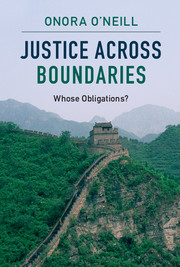2 - Rights, obligations and world hunger
from Part I - HUNGER ACROSS BOUNDARIES
Published online by Cambridge University Press: 05 February 2016
Summary
Hunger and famine
Many of the facts of world hunger and poverty towards the end of the twentieth century were widely known, among them the following:
World population was over 5 billion and rising rapidly. It would exceed 6 billion by the end of the century.
In many poor countries, investment and growth were concentrated in an urbanised modern sector, and the benefits reached a minority.
In many poor countries, the number of destitute and landless increased even when there was economic growth.
In many African countries, harvests had been falling and dependence on imported grain was growing.
The rich countries of the ‘North’ had surpluses of grain that went to poorer countries, most of it being sold.
The rural poor of the Third World were sometimes harmed by grain imports, which were distributed in towns, so depriving peasants of customers for their crops. These peasants then migrated to shantytowns.
And then there was Ethiopia. Famines are not unexpected natural catastrophes, but simply the harshest extreme of hunger. We know well enough where in the world poverty and hunger are constantly bad enough for minor difficulties to escalate into famine. Ethiopia had had earlier famines. We know which regions in Africa, Asia and (to a lesser degree) Latin America are vulnerable. Famine is the tip of the iceberg of hunger. It is the bit that is publicised and to which we react; but the greater part of the suffering is less lurid and better hidden.
Most hungry people are not migrating listlessly or waiting for the arrival of relief supplies. They are leading their normal lives with their normal economic, social and familial situations, earning and growing what they normally earn or grow, yet are always poor and often hungry. These normal conditions are less spectacular than famine, but affect far more people. We are tempted to set famine aside from endemic hunger and poverty. We often blame natural catastrophes, such as floods, drought, blight or cold for destroying crops and producing famine. But harsh circumstances cause famines only when social and economic structures are too fragile to absorb such natural shocks. Californians know that desert climates need not lead to famines. Minnesotans know that a ferocious winter need not be reflected in countless annual deaths from cold. Yet both regions would have catastrophic annual mortality if they lacked appropriate social and economic structures.
- Type
- Chapter
- Information
- Justice across BoundariesWhose Obligations?, pp. 29 - 42Publisher: Cambridge University PressPrint publication year: 2016
- 3
- Cited by

